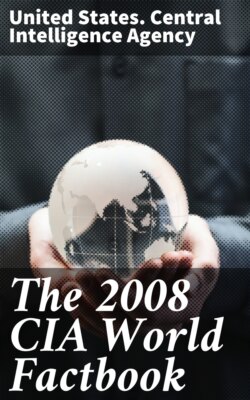Читать книгу The 2008 CIA World Factbook - United States. Central Intelligence Agency - Страница 337
На сайте Литреса книга снята с продажи.
XAF
ОглавлениеExchange rates:
Communaute Financiere Africaine francs (XAF) per US dollar - 483.6 (2007), 522.59 (2006), 527.47 (2005), 528.29 (2004), 581.2 (2003)
Communications
Congo, Republic of the
Telephones - main lines in use:
15,900 (2005)
Telephones - mobile cellular:
1.334 million (2007)
Telephone system:
general assessment: services barely adequate for government use; key exchanges are in Brazzaville, Pointe-Noire, and Loubomo; intercity lines frequently out of order; fixed-line infrastructure inadequate providing less than 1 connection per 100 persons; in the absence of an adequate fixed line infrastructure, mobile-cellular subscribership has surged reaching 35 per 100 persons domestic: primary network consists of microwave radio relay and coaxial cable international: country code - 242; satellite earth station - 1 Intelsat (Atlantic Ocean)
Radio broadcast stations:
AM 1, FM 5, shortwave 3 (2001)
Radios:
341,000 (1997)
Television broadcast stations:
1 (2001)
Televisions:
33,000 (1997)
Internet country code:
.cg
Internet hosts:
5 (2008)
Internet Service Providers (ISPs):
1 (2000)
Internet users:
70,000 (2006)
Transportation
Congo, Republic of the
Airports:
31 (2007)
Airports - with paved runways:
total: 5 over 3,047 m: 2 2,438 to 3,047 m: 1 1,524 to 2,437 m: 2 (2007)
Airports - with unpaved runways:
total: 26 1,524 to 2,437 m: 7 914 to 1,523 m: 10 under 914 m: 9 (2007)
Pipelines:
gas 89 km; liquid petroleum gas 4 km; oil 758 km (2007)
Railways:
total: 894 km narrow gauge: 894 km 1.067-m gauge (2006)
Roadways:
total: 17,289 km paved: 864 km unpaved: 16,425 km (2004)
Waterways:
1,125 km (commercially navigable on Congo and Oubanqui rivers) (2006)
Merchant marine:
registered in other countries: 1 (Congo, Democratic Republic of the 1) (2008)
Ports and terminals:
Brazzaville, Djeno, Impfondo, Ouesso, Oyo, Pointe-Noire
Military
Congo, Republic of the
Military branches:
Congolese Armed Forces (Forces Armees Congolaises, FAC): Army, Navy,
Congolese Air Force (Armee de l'Air Congolaise), Gendarmerie,
Special Presidential Security Guard (GSSP) (2008)
Military service age and obligation:
18 years of age for voluntary military service; women allowed to serve (2007)
Manpower available for military service:
males age 16–49: 842,771 females age 16–49: 833,624 (2008 est.)
Manpower fit for military service:
males age 16–49: 519,296 females age 16–49: 509,564 (2008 est.)
Manpower reaching militarily significant age annually:
male: 45,671 female: 45,248 (2008 est.)
Military expenditures:
3.1% of GDP (2006)
Transnational Issues
Congo, Republic of the
Disputes - international:
the location of the boundary in the broad Congo River with the Democratic Republic of the Congo is indefinite except in the Pool Malebo/Stanley Pool area
Refugees and internally displaced persons:
refugees (country of origin): 46,341 (Democratic Republic of Congo);
6,564 (Rwanda)
IDPs: 48,000 (multiple civil wars since 1992; most IDPs are ethnic
Lari) (2007)
Trafficking in persons:
current situation: Republic of the Congo is a source and destination country for children trafficked for the purposes of forced labor and commercial sexual exploitation; girls are trafficked from rural areas within the country for commercial sexual exploitation, forced street vending, and domestic servitude; children are trafficked from other African countries for domestic servitude, forced market vending, and forced labor in the fishing industry tier rating: Tier 2 Watch List - Republic of the Congo is on the Tier 2 Watch List for its failure to show evidence of increasing efforts to combat trafficking in persons in 2007; struggling to recover from six years of civil conflict that ended in 2003, the Republic of the Congo's capacity to address trafficking is handicapped; the government neither monitors its borders for trafficking activity nor provides specialized anti-trafficking training for law enforcement officials; the government does not encourage victims to assist in trafficking investigations or prosecutions, and has not taken measures to reduce demand for commercial sex acts in the Republic of the Congo (2008)
This page was last updated on 18 December, 2008
======================================================================
@Cook Islands
Introduction
Cook Islands
Background:
Named after Captain COOK, who sighted them in 1770, the islands became a British protectorate in 1888. By 1900, administrative control was transferred to New Zealand; in 1965, residents chose self-government in free association with New Zealand. The emigration of skilled workers to New Zealand and government deficits are continuing problems.
Geography
Cook Islands
Location:
Oceania, group of islands in the South Pacific Ocean, about half way between Hawaii and New Zealand
Geographic coordinates:
